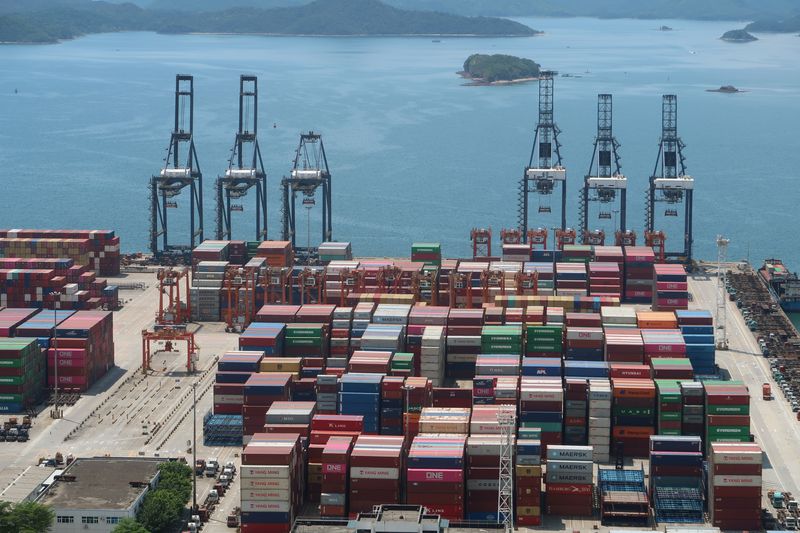BEIJING (Reuters) - China's exports and imports likely contracted further in November due to weakening global demand, production disruptions and waning demand at home amid widespread pandemic controls, a Reuters poll showed on Monday.
Data for November are expected to show a 3.5% fall in outbound shipments from a year earlier, after October's figures were down an annual 0.3%, according to the median forecast of 28 economists in the poll. That would mark the worst performance since May 2020.
Actual trade data will be released on Wednesday.
The frail economists' estimate for exports suggests cooling global demand that has been hurt by higher interest rates in major economies will heap more pressure on policymakers in China, as the country's property downturn and struggle to contain COVID-19 continue to take a toll on the economy.
Sub-indexes for new export orders in both the official and private-sector factory activity surveys extended declines last month, pointing to a protracted downturn in exports.
COVID outbreaks in November in manufacturing hubs, such as Zhengzhou and Guangzhou, likely also disrupted production and weighed on exports.
Following worker unrest that disrupted the world's biggest iPhone factory, in Zhengzhou, Apple (NASDAQ:AAPL) supplier Foxconn expects the plant to resume full production around late December to early January, Reuters reported, citing a Foxconn source.
Due to a high year-earlier base for comparison and sluggish domestic demand, economists estimated November imports had been down 6.0%. That compares with a 0.7% annual decline in October and would mark the worst fall since May 2020.
South Korean exports to China, a leading indicator for China's imports, were 25.5% lower in November than a year earlier, marking their sixth straight month of annual declines and the worst since May 2009.
The median estimate in the poll indicated a narrower trade surplus of $78.1 billion, compared with $85.15 billion in October.
China's economy slowed broadly in October, and analysts said the pain may have lingered in November as COVID flare-ups across many cities prompted fresh lockdowns and curbs.
"The overall economy may barely grow at all in November, adding conviction to our below-consensus GDP growth forecast of 2.4% year-on-year for Q4," said analysts at Nomura in a note.
Beijing has introduced a vaccination campaign for the elderly, and some local governments are relaxing lockdowns, quarantine rules and testing requirements. But six high-profile economists in an article published on the weekend jointly called for further opening up of economic activities.

"In the near future, priority should be given to opening up economic activities such as public transportation, office buildings, restaurants, hotels, logistics, shopping malls, and other places," they wrote.
"It is proposed that, to stabilise expectations and boost everyone's confidence, the gross domestic product growth target for 2023 should be set at above 5% and a clear signal should be sent that development has top priority and economic activities are opened up."
(Poll compiled by Anant Chandak, Dhruvi Shah and Veronica Khongwir; Reporting by Ellen Zhang and Ryan Woo)